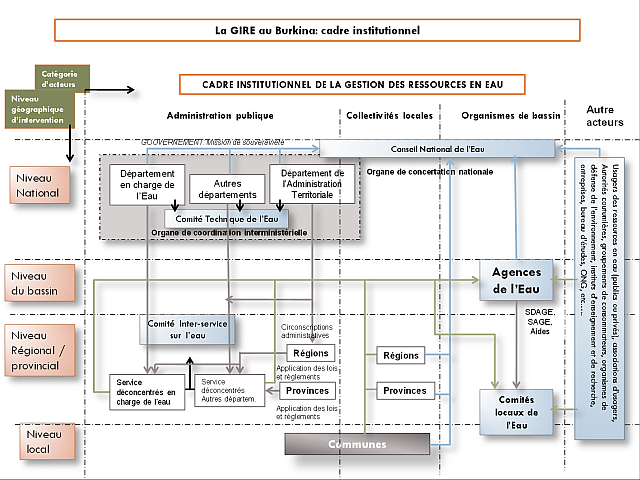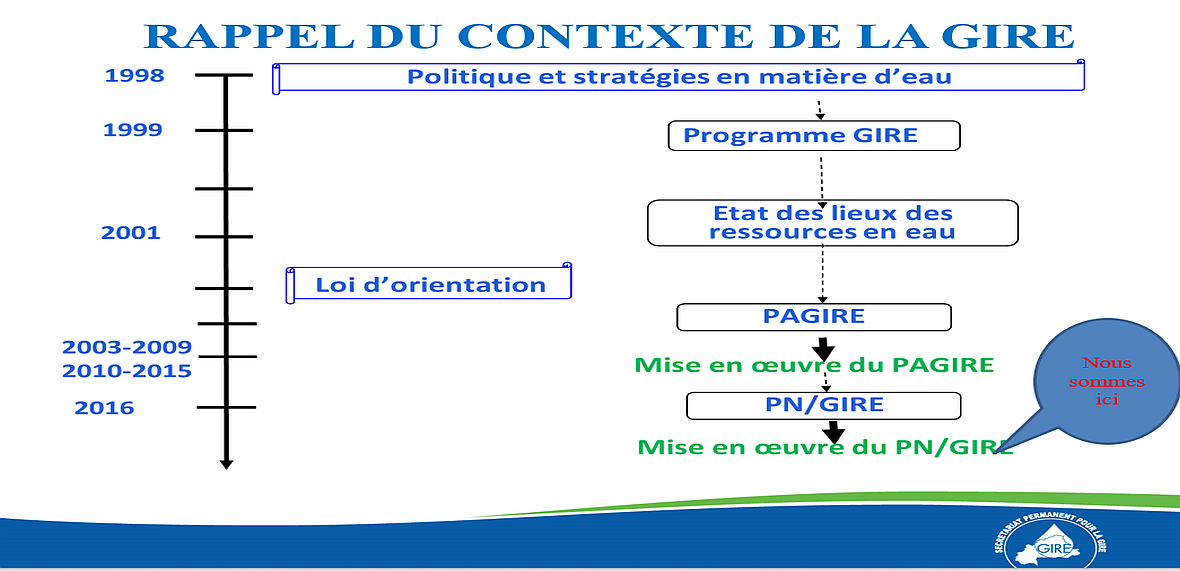 At the level of the institutional framework, the achievements can be summarised as follows:
At the level of the institutional framework, the achievements can be summarised as follows:
- The setting up and strengthening of central and decentralised water administration structures.
- The setting up and referral to the National Water Council (CNEau), a consultative body, for advice on issues relating to the water sector.
- The setting up of the Technical Water Committee (CTE), which rules on dossiers relating to the water sector.
- The setting up of five (5) Water Agencies which are functional through the bodies that are the Directorate General (DG), the Board of Directors (CA), the Basin Committees (CB).
- The setting up of the Regional Inter-Service Water Committee (CISE), which decides on the files of projects and programmes in the water sector in their region/province.
- The setting up of Local Water Committees (CLE), of which there are currently 43 CLE.
- The setting up of Water Police Services, of which there are 13 to date.
At the level of the legal and financial frameworks, the achievements include:
- The adoption of the orientation law on water management in 2001.
- The drafting and adoption of more than thirty decrees for the application of the law.
- The elaboration and adoption of texts on the legal status of agencies.
- The adoption of the law on the Financial Contribution on Water (CFE) and the decree on the tax on raw water abstraction.
At the level of the National Water Information System (SNIEau), the following were recorded:
- The optimisation of the monitoring network (hydrometric and piezometric).
- The creation of the Database (DB) / MDG-GIS and of the NWIS.
- The ongoing development of the WIS-DB.
- The strengthening of the National Water Documentation and Information Centre (CNDIEau) and creation of Regional Centres (CRDIEau).
Within the framework of human resources strengthening, we note:
- The initial training of 128 engineers, including more than 30 women (2iE and ENI), 18 Senior Technicians in hydrology, 23 Water Technical Assistants.
- Immersion courses and various training courses on IWRM for the benefit of the actors.
- Recruitment of personnel for the benefit of the implementation structures.
- Capacity building of communities, the private sector and civil society.

As part of the implementation of Information-Education-Communication (IEC) actions on IWRM principles and tools:
- IWRM information/awareness workshops at national and regional levels as well as TV and radio broadcasts have been organized.
- The dissemination of IWRM documents and publications; and
- The creation of a website www.eauburkina.org.
Within the framework of the implementation of emergency measures/ protection of the resource, there has been the delimitation of protection perimeters, the protection of river banks, the fight against silting up/siltation, the fight against invasive plants and the creation of access tracks to water (livestock).
Ms. NARE listed the major challenges facing IWRM in Burkina Faso. She highlighted the challenges related to:
- Mobilization and distribution of water resources as well as management of various conflicts of use to cope with an increasing population.
- The knowledge and protection of water resources in the face of pollution from various sources.
- The preservation of the integrity of the ecosystems as well as a better protection and management of the water courses, the water bodies and the water sources.
- Protection against floods, drought, water-borne diseases, and the risks of water-related disruptions and other hazards.
- The promotion of peaceful cooperation and the development of synergies between the various water uses through sustainable management of border and transboundary water resources.
Ms. NARE concluded by stating that "in West Africa, Burkina Faso is one of the few countries that have made significant progress in the IWRM process. However, the process is not complete and actions are still needed to continue this reform and consolidate the implementation of IWRM in the country”.
 Mrs Nadine NARE/OUERECE
Mrs Nadine NARE/OUERECE
